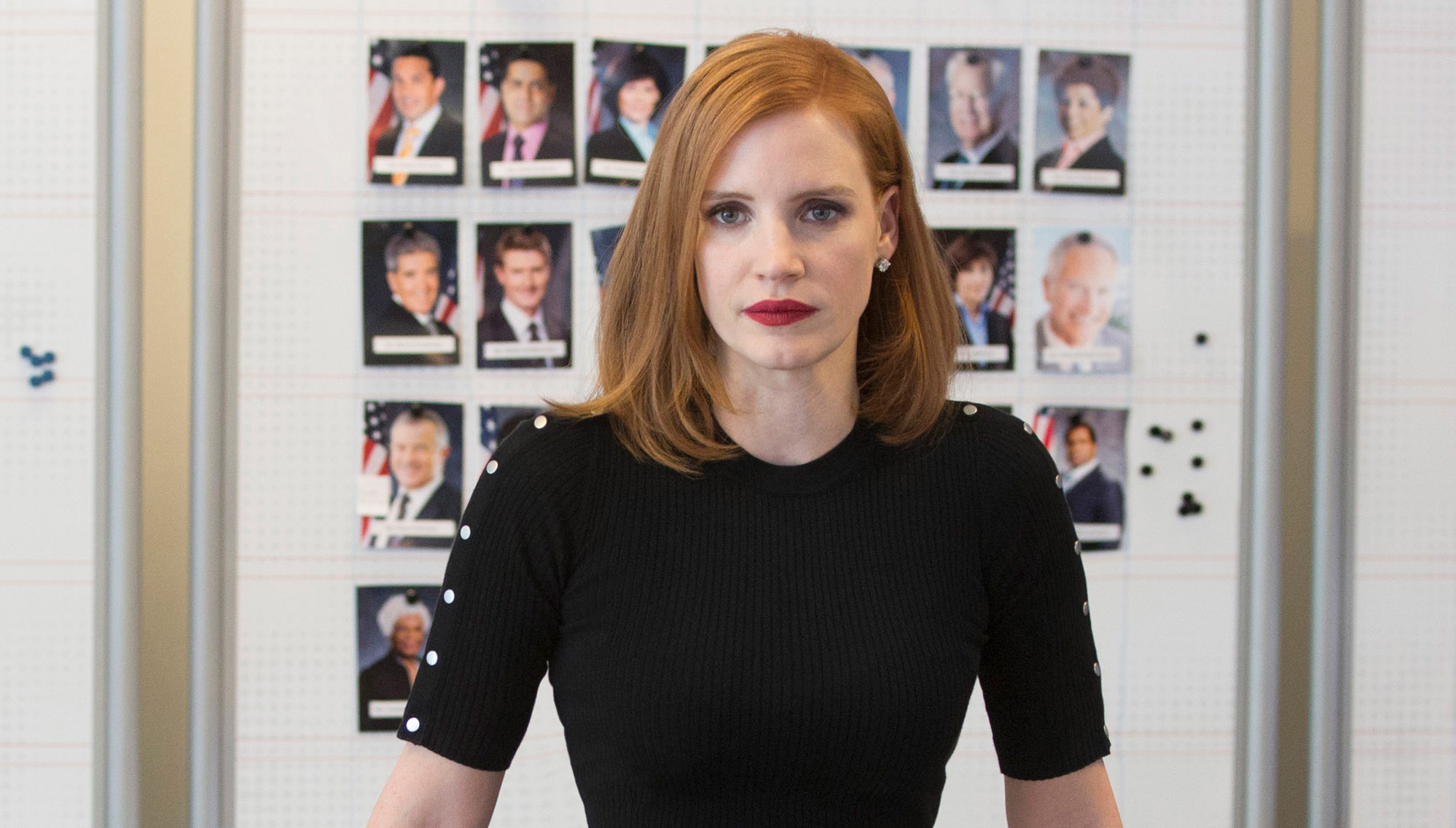Jessica Chastain is a great actress, but with “Miss Sloane,” she also proves that she’s a great movie star. Headlining the sort of pulse-pounding adult thriller that studios rarely produce anymore — and, as evidenced by this past May’s “Money Monster,” even more rarely succeed with at the domestic box office — Chastain is a one-woman force of nature as a dominant D.C. lobbyist mired in a fierce political battle with her former firm. Stalking the screen with intimidating take-no-shit confidence, laying out plans and dispensing orders with rapid-fire precision, and countering those who oppose her with meticulous verbal lashings, Elizabeth Sloane is a larger-than-life embodiment of Capitol Hill ruthlessness, amorality, and cunning. In Chastain’s skillful hands, she’s a Machiavellian assassin in a designer business suit.

While supported by a cast of illustrious co-stars, Chastain is the main attraction of “Miss Sloane,” which operates as the most Aaron Sorkin-y movie not actually written by the “Steve Jobs” and “The West Wing” scribe. Jonathan Perera’s script opens with Sloane rehearsing a speech (of her guiding ethos, as it turns out) directly to the camera before pulling back to introduce us to her world of high-stakes political power-broking. It is, per Sorkin’s influence, a milieu of capable professionals walking and talking with a briskness that speaks to both their expertise and to their manic-to-the-point-of-self-destruction personalities. That’s most true of Sloane, whose perfectly styled red locks and equally immaculate outfits radiate don’t-tread-on-me authority, even as she repeatedly takes time out of her busy schedule to head to the bathroom to pop some pills for an additional insomnia-fostering energy boost.
READ MORE: “It’s Not a Propaganda Movie”: Jessica Chastain On Torture, The CIA & ‘Zero Dark Thirty’
As we quickly learn, Sloane is testifying at a congressional hearing about her own alleged misconduct, and that trial — overseen by John Lithgow’s congressman — looms large over the action. Most of “Miss Sloane” takes during the tumultuous preceding months, focusing on her decision to abandon her firm — which has just agreed to back the gun lobby’s new campaign to appeal to women — and join a boutique outfit run by Rodolfo Schmidt (Mark Strong), which is in the process of promoting a bill that would require greater background checks for firearm purchases. This move alienates her from her previous boss (Sam Waterston) and associate (Michael Stuhlbarg), and puts her in charge of a young and hungry team that also includes Esme Manucharian (Gugu Mbatha-Raw), who (much to her discomfort and then dismay) soon factors heavily in Sloane’s plans to get the seemingly doomed piece of legislation passed.

That gun-control fight is the story’s nominal focus, but the film — directed by John Madden with just the right balance of insider-baseball suspense and character drama — is less about its hot-button subject matter than about Sloane’s increasingly perilous scheming. Although it’s clear from the get-go that she cares about winning at any cost, “Miss Sloane” (which at one point slyly alludes to its pulp-paperback John Grisham roots) never reduces Sloane to simply an unethical cretin headed toward a deserved comeuppance. On the contrary, it uses its numerous narrative twists and turns (including a running thread involving Sloane’s all-business relationship with Jake Lacy’s male escort) to reveal her interior life, all while refusing to provide banal backstory explanations for why she is who she is, or why she behaves in ways that make most others blush — if not outright gasp with both admiration and horror. The same holds for Madden and Perera’s other players, including Alison Pill’s spurned-by-Sloane colleague, as the material consistently lets action elucidate character.
Consequently, its momentum only flags during those occasional moments when its plotting gets a bit too bogged down in breakneck left turns. However, even when a pile-up of betrayals, near-tragedies, and unexpected developments threaten to derail the proceedings, Chastain’s performance maintains its imposing intensity and crafty complexity. Her star turn climaxes during a terrific finale that’s no less satisfying for being thoroughly preposterous, with the actress delivering a magnetic speech that solidifies the notion, felt throughout the film, that politics is part warfare, part espionage, and part performance-art. No matter the outlandish artifice it eventually peddles, “Miss Sloane” recognizes, like its protagonist, that making good on promises and delivering a rousing triumph sometimes invariably involves cutting some corners. [B+]








